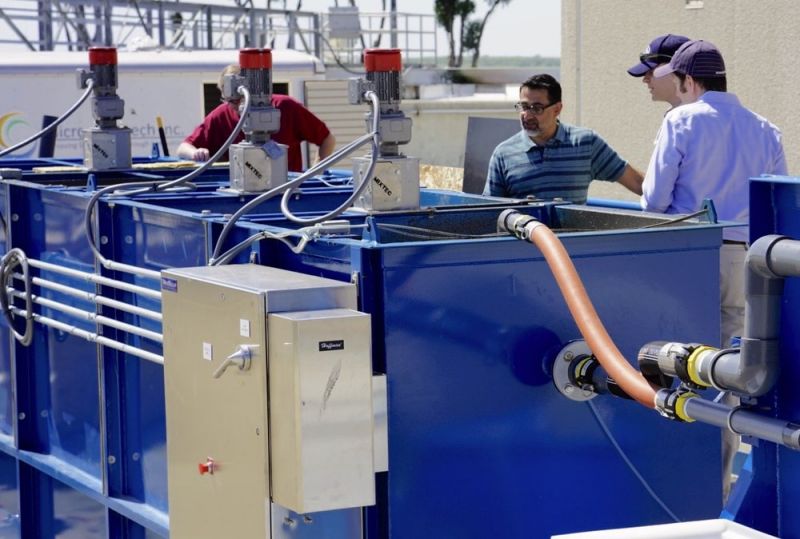Microvi MNE, New Biological Process for Ammonia Removal Implemented at Thames Water’s Infrastructure
Published on by Water Network Research, Official research team of The Water Network in Technology
Thames Water Utilities Ltd., Microvi Biotechnologies, and WesTech Engineering, Inc. are conducting a collaborative demonstration for transformational wastewater treatment at the Thames Water treatment plant in Sherfield-on-Loddon, UK. This demonstration of Microvi’s proprietary treatment technology, Microvi MNE™, was installed and commissioned in June.
By Karin Kidder, VP of Marketing, Microvi Biotechnologies

Image source: Microvi
The Microvi MNE process could work within Thames Water’s existing infrastructure and aims to help with impending challenges while providing an economical and environmentally beneficial solution.
Microvi and WesTech have installed a fully automated Microvi MNE demonstration plant configured as a tertiary nitrification system for ammonia removal. Microvi’s MNE technology intensifies the treatment process, allowing Thames Water to treat more wastewater within existing infrastructure—meeting the demands of anticipated population growth.
“We are excited to partner with Thames Water to demonstrate the efficacy of Microvi MNE for ammonia removal, in spite of cold temperatures,” said Dr. Fatemeh Shirazi, CEO and CTO of Microvi. “When other treatment methods fail due to decreased activity in cold temperatures, Microvi MNE continues to deliver impressive removal rates. We’ve started seeing these results at the Thames Water site and look forward to pushing the technology to meet the industry’s needs.”
“We’re always looking for new ways to be more efficient and resilient in how we care for the precious environment in which we operate, while managing impacts of climate change and population growth. I’m excited to find out if the Microvi MNE process provides a robust ammonia treatment for our sites especially over the colder winter months,” said Dr. Eve Germain-Cripps, Wastewater Research, Development and Innovation Manager at Thames Water.
Microvi’s wastewater technology has significant advantages over conventional wastewater treatment processes. It requires a smaller footprint and does not generate biological solids, while removing BOD, ammonia, phosphorus and nitrate. With potentially more efficient oxygen demand and reduced recycle pumping it also has lower energy costs. The solution is operator friendly, stable, robust, and can be used in existing infrastructure.
Microvi’s technologies have been demonstrated in the US, Australia and the UK for drinking water, municipal wastewater, and industrial applications.
About Microvi
Microvi is a green technology company based in the San Francisco Bay Area that delivers next-generation biotechnologies for the water, wastewater and renewable chemical industries. Microvi offers commercial technologies around the world to reduce waste, increase productivity and provide disruptive economics. Learn more at www.microvi.com.
About WesTech Engineering, Inc.
WesTech Engineering, Inc. provides process solutions for water treatment, liquids/solids separation, and biological treatment needs to municipal, industrial, and minerals clients worldwide. Founded in 1973, WesTech is an employee-owned company, with over 500 employees in seven countries. WesTech is ISO 9001 certified. For more information, please visit www.westech-inc.com.
About Thames Water Utilities Ltd.
Thames Water is the UK’s biggest water and wastewater services provider. We have invested more than £1 billion every year, on average, for the past 13 years improving service for more than 15 million customers across London, the Thames Valley and surrounding areas. For an average of just over £1 a day for our households, we provide 2.7 billion litres of clean drinking water and safely remove 4.4 billion litres of wastewater – every day, 365 days a year. We are regulated by Ofwat, the Environment Agency and Drinking Water Inspectorate and, as part of our draft £11.7 billion business plan for 2020-25, propose to invest record amounts on improving resilience, service and efficiency, as well as providing more support for customers in vulnerable circumstances.
Source: Microvi
Media
Taxonomy
- Reclaimed Wastewater
- Biological Treatment
- Industrial Wastewater Treatment
- Decentralized Wastewater
- Wastewater Treatment
- Biological Treatment
- Solid Wastes & Wastewater Recycling
- Environment
- Wastewater Treatment Plant Design
- Environment & Water
- Water microbiology
- Environment
- Environment Protection and Pollution control
- Water and Wastewater Manager
- water, wastewater, reclaimed water, water resources planning